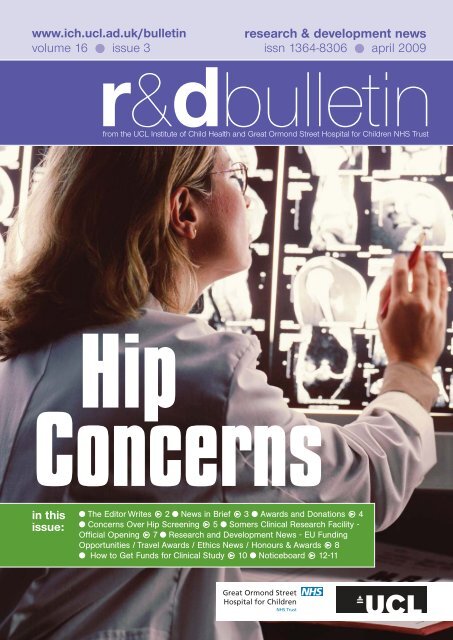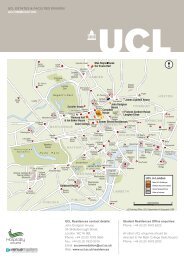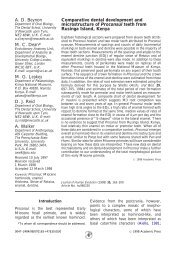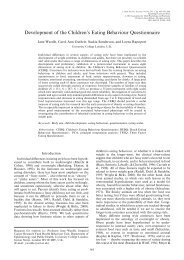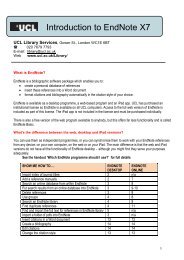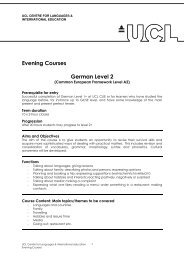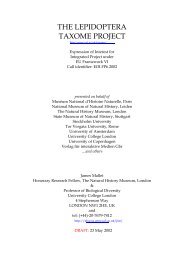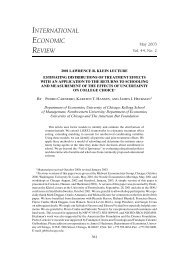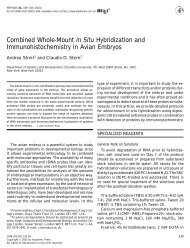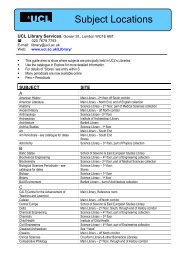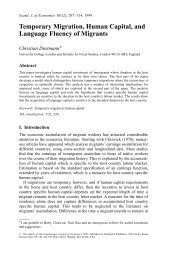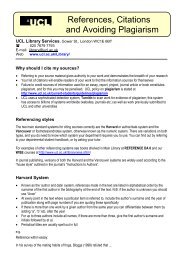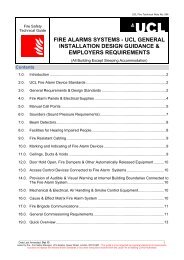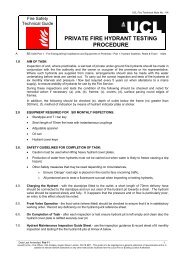Somers Clinical Research Facility - University College London
Somers Clinical Research Facility - University College London
Somers Clinical Research Facility - University College London
Create successful ePaper yourself
Turn your PDF publications into a flip-book with our unique Google optimized e-Paper software.
www.ich.ucl.ad.uk/bulletin<br />
research & development news<br />
issn 1364-8306 ● april 2009<br />
volume 16 ● issue 3<br />
r&dbulletin<br />
from the UCL Institute of Child Health and Great Ormond Street Hospital for Children NHS Trust<br />
Hip<br />
Concerns<br />
in this<br />
issue:<br />
● The Editor Writes p 2 ● News in Brief p 3 ● Awards and Donations p 4<br />
● Concerns Over Hip Screening p 5 ● <strong>Somers</strong> <strong>Clinical</strong> <strong>Research</strong> <strong>Facility</strong> -<br />
Official Opening p 7 ● <strong>Research</strong> and Development News - EU Funding<br />
Opportunities / Travel Awards / Ethics News / Honours & Awards p 8<br />
● How to Get Funds for <strong>Clinical</strong> Study p 10 ● Noticeboard p 12-11
The R&D Bulletin<br />
is published by the<br />
R&D Office –<br />
UCL Institute of Child<br />
Health & Great Ormond<br />
Street Hospital,<br />
30 Guilford Street,<br />
<strong>London</strong> WC1N 1EH<br />
ISSN: 1364-8306<br />
April 2009<br />
Volume 16, Issue 3<br />
Editor:<br />
James King<br />
020 7905 2846<br />
j.king@ich.ucl.ac.uk<br />
The R&D Bulletin<br />
is prepared in the<br />
R&D Office.<br />
The views expressed<br />
herein do not necessarily<br />
reflect official<br />
ICH/GOSH policy.<br />
Data Protection<br />
Statement:<br />
If you receive this<br />
magazine by post details<br />
of your name and address<br />
are held on our mailing list<br />
database. If at any time<br />
you would like to have<br />
these details updated or<br />
removed please do<br />
contact us<br />
Deadline for Submission:<br />
Friday 17 April 2009<br />
Stories for the Bulletin:<br />
If you would like to submit,<br />
or there is something you<br />
would like to feature in<br />
a future issue please<br />
email the editor:<br />
j.king@ich.ucl.ac.uk<br />
r&dbulletin<br />
the editor writes...<br />
Welcome to the April edition of the R&D Bulletin – and it would<br />
appear that Spring has finally sprung.<br />
In this packed issue we have an interview<br />
with Dr Roposch on a report<br />
commissioned by the charity STEPS on<br />
the effectiveness of the national<br />
screening programme to detect<br />
Developmental Hip Dysplasia (DHD). In<br />
addition Dr Stephen Barnett reports on<br />
Design: Kavita Graphics,<br />
020 7252 1915, dennis@kavitagraphics.co.uk<br />
2 issue 3 ● april 2009 ● research&developmentnews<br />
developments at the <strong>Somers</strong> <strong>Clinical</strong><br />
<strong>Research</strong> <strong>Facility</strong>, and there is a report<br />
on the winners of the the John<br />
Lipscombe Memorial Travel Awards.<br />
Enjoy!<br />
James King<br />
Editor<br />
Printed by: Russell Press, Russell House,<br />
Bulwell Lane, Basford, Nottingham NG6 0BT
newsinbrief ... newsinbrief ... newsinbrief ...<br />
Two year old with rare disease treated at GOSH<br />
The Daily Telegraph reports that two-year old Kian<br />
Baker, diagnosed with Purine Nucleoside<br />
Phosphorylase (PNP) Deficiency, is being cared for at<br />
Great Ormond Street Hospital (GOSH). Dr Graham<br />
Great Ormond Street Hospital and the UCL Institute<br />
of Child Health will play a key role in the new alliance<br />
for health research delivering benefits for patients.<br />
This news is covered in the <strong>London</strong> Evening<br />
Standard.<br />
UCL Partners (UCLP) has been designated as one of<br />
the UK’s first academic health science centres<br />
(AHSC). The Partnership is one of just five bids which<br />
satisfied the Department of Health’s rigorous<br />
selection process, demonstrating that it possessed<br />
excellence in research, education and patient care.<br />
The application process involved rigorous peer<br />
review by a panel of international experts.<br />
UCLP comprises five of <strong>London</strong>’s biggest and best<br />
known hospitals and research centres: <strong>University</strong><br />
<strong>College</strong> <strong>London</strong> (UCL)/<strong>University</strong> <strong>College</strong> <strong>London</strong><br />
Hospitals NHS Foundation Trust (UCLH), Institute of<br />
Child Health (ICH)/Great Ormond Street Hospital for<br />
Children NHS Trust (GOSH), Moorfields Eye Hospital<br />
NHS Foundation Trust/Institute of Ophthalmology<br />
(IoO), and the Royal Free Hampstead NHS Trust.<br />
Davies, consultant immunologist at GOSH, is quoted<br />
in the piece as saying: “PNP is an extremely rare<br />
metabolic condition which can affect the nervous<br />
system, leading to problems with movement.”<br />
UCL Partners one of “UK’s first academic health<br />
science centres”<br />
Baby Bio Bank<br />
Professor Gudrun Moore is jointly leading a new<br />
research resource which will help address the four<br />
key complications of pregnancy; recurrent<br />
miscarriage, intrauterine growth restriction<br />
(abnormally small babies), pre-eclampsia (high blood<br />
pressure in pregnancy) and preterm delivery.<br />
This unique global resource is being funded by<br />
Wellbeing of Women, the only UK charity dedicated<br />
to solving the health issues that solely affect women.<br />
The research will involve collecting blood samples<br />
from the parents and placenta from the babies<br />
Child Health will be one of the major areas of focus<br />
for the Partners, building on the existing strength of<br />
the relationship between Great Ormond Street<br />
Hospital for Children and the UCL Institute of Child<br />
Health. The Partnership will bring together the<br />
combined skill and expertisein three key areas –<br />
clinical care, research and development, and teaching<br />
and learning, to focus initially on seven areas:<br />
infectious diseases; neurological disorders; eyes and<br />
vision; cardiovascular; child health; women’s health;<br />
and immunology and transplantation.<br />
Commenting on the award of AHSC status, Sir Cyril<br />
Chantler, Chairman of UCL Partners, said: “This is<br />
fantastic news, and a great tribute to the skill,<br />
expertise and team work of clinicians and<br />
researchers within UCL Partners.”<br />
● For further information please visit the UCL<br />
Partners website at www.uclpartners.com or<br />
contact Neil Goodwin, Project Director, UCL<br />
Partners, on +44 (0)7831 886 834 or at<br />
neil.goodwin@uclh.nhs.uk<br />
affected by any of these complications. This will be<br />
the first study of its kind and the most extensive, as it<br />
will analyse not only maternal but paternal<br />
inheritance patterns.<br />
The project is being headed up by Professor Lesley<br />
Regan, (St Mary’s, Imperial <strong>College</strong> <strong>London</strong>)<br />
internationally acclaimed Obstetrician and<br />
Gynaecologist and researcher into recurrent<br />
miscarriage and Professor Gudrun Moore, (Institute of<br />
Child Health, <strong>University</strong> <strong>College</strong> <strong>London</strong>) international<br />
researcher into the genetic aetiology of intrauterine<br />
growth restriction and pregnancy complications.<br />
issue 3 ● april 2009 ● research&developmentnews 3
awards&donations<br />
Approx £ 1,990,531 awarded in February and March<br />
Arthritis <strong>Research</strong> Campaign<br />
via Belfast Health and Social<br />
Care Trust<br />
Dr Clarissa Pilkington, Dr D Sen,<br />
Dr N Hasson and Dr C Lowry<br />
received funding for the project:<br />
“Prevention and treatment of<br />
steriod-induced osteopaenia in<br />
children and adolescents with<br />
rheumatic diseases”.<br />
● Value of Award: £64,000<br />
Arthritis <strong>Research</strong> Campaign<br />
Dr P Brogan, Dr L Wedderburn and<br />
Dr C Pilkington received funding<br />
for the project: “Investigating the<br />
pathogenic mechanisms of<br />
juvenile dematomyostasis (JDM):<br />
the vasculopathy of JDM”.<br />
● Value of Award: £30,151<br />
Action Duchenne<br />
Dr J Morgan received funding for<br />
the project: “Muscle-derived stem<br />
cells to treat Duchenne muscular<br />
dystrophy”.<br />
● Value of Award: £181,033<br />
BECTA<br />
Dr K Price received funding for the<br />
project: “Outcomes for children<br />
with complex communication<br />
needs assessed for<br />
communications aids”.<br />
● Value of Award: £3,732<br />
NHS Blood and Transplant Tust<br />
Professor N Klein and Dr J Hartley<br />
received funding for the project:<br />
“Transfusion transmitted infection<br />
in the immunonaive/immunocompromised<br />
childhood recipient”.<br />
● Value of Award: £8,000<br />
Biomedical <strong>Research</strong> Centre<br />
Dr L Rees and Dr R Schroff<br />
received funding for the project:<br />
“Vitamin D levels in paediatric<br />
renal transplant recipients – a<br />
cross sectional study”.<br />
● Value of Award: £3,000<br />
Dr W Qasim, Professor B Gaspar<br />
and Dr P Veys received funding for<br />
the project: “Antiviral cell therapy<br />
after allogeneic stem cell<br />
transplantation”.<br />
● Value of Award: £56,366<br />
Professor Christine Kinnon and<br />
Professor A Thrasher received<br />
funding for the: “Pilot study: to<br />
investigate the feasibility of gene<br />
therapy for Wilson’s disease”.<br />
● Value of Award: £29,558<br />
Dr K Hussain, Professor R<br />
Hennekam and Dr S Eaton<br />
received funding for the project:<br />
“The role of the nucleoside<br />
transporter gene SLC29A3 in<br />
pancreatic endocrine and<br />
exocrine tissue”.<br />
● Value of Award: £96,911<br />
Dr L Wedderburn and Dr P Hunter<br />
received funding for the project:<br />
“Development of cellular and<br />
molecular tools to predict<br />
outcome of childhood arthritis<br />
(juvenile idiopathic arthritis, JIA) to<br />
sever disease”.<br />
● Value of Award: £56,462<br />
Dr J Rahi, Miss A Solebo and Mrs I<br />
Russell-Eggitt received funding for<br />
the: “National study of primary<br />
intraocular lens implantationin<br />
children aged
medical treatment versus<br />
gastrostomy with fundoplication<br />
in children with neurological<br />
impairment”.<br />
● Value of Award: £189,519<br />
European Union (EU)<br />
Professor B Neville, Professor H<br />
Cross, Dr S Aylett and Dr M Clark<br />
received funding for the project:<br />
“European network of expertise<br />
for rare paediatric neurological<br />
disorders (NEUROPED)”.<br />
● Value of Award: £75,969<br />
(€104,067)<br />
Children with Leukaemia via<br />
Great Ormond Street<br />
Children’s Charity (GOSHCC)<br />
Dr Q Wasim, Professor A Thrasher<br />
and Dr N Goulden received<br />
funding for the project: “T cell<br />
receptor therapy against<br />
leukaemia”.<br />
● Value of Award: £210,301<br />
Olivia Hudson Cancer Fund<br />
Dr A Sala received funding for<br />
the project: “Assessment of the<br />
biological significance of thhe<br />
B-MYB/MYCN axis in human<br />
neuroblastoma”.<br />
● Value of Award: £20,300<br />
Newlife Foundation<br />
Professor P Beales has received<br />
funding to support Dr A Diaz-<br />
Font for the project: “Defining<br />
molecular heterogeneity in<br />
ciliopathies”.<br />
● Value of Award: £119,998<br />
Ipsen Ltd<br />
Dr K Hussain received funding<br />
for the study: “Ipsen Increlex<br />
EU registry”.<br />
● Value of Award: £1,85<br />
concernsoverhipscreening<br />
Developmental Hip Dysplasia (DHD) is a<br />
developmental disorder affecting infants and young<br />
children and is the most common inborn musculo<br />
skeletal disorder. A national screening policy was<br />
introduced in the UK in 1969 to identify and treat<br />
infants with a hip abnormality at an early stage.<br />
Detection in the first few weeks of life leads to a<br />
simple outpatient treatment that has been shown to<br />
have good outcomes for the patient.<br />
by James King<br />
Areport commissioned by STEPS, 1 a national<br />
charity supporting children and adults with<br />
lower limb conditions, such as DHD, was<br />
launched at the House of Commons in February. The<br />
charity also launched Baby Health Hip Week to<br />
coincide with the release of the report. James King<br />
spoke to Dr Andreas Roposch about the reports<br />
findings.<br />
The report found that policies and clinical<br />
guidelines of Acute Trusts and Primary Care Trusts<br />
(PCT) for the infant hip examination (part of the<br />
UK hip screening programme) to identify DHD in<br />
infants in were inconsistent. STEPS asked Acute<br />
Trusts and PCTs in England to submit existing<br />
guidelines and formal policy on baby hip checks.<br />
Of those who responded, it was revealed 57 per<br />
cent of PCTs and 10 per cent of Acute Trusts have<br />
no formal policy in place for hip evaluation. The<br />
report found that PCT polices tended to be more<br />
generic with less detailed reference to hip<br />
examinations , for example when to use<br />
ultrasound as a diagnostic tool, when compared<br />
to Acute Trusts.<br />
Dr Andreas Roposch was asked to provide expert<br />
feedback in advance of the report’s launch, and<br />
was present at the launch at the House of<br />
issue 3 ● april 2009 ● research&developmentnews 5
Commons to provide his expertise at a discussion<br />
of the report’s findings.<br />
Dr Roposch explained that it was important that<br />
the established national hip screening guidelines<br />
should be adhered to, in order to guarantee an<br />
early diagnosis and provide treatment where<br />
needed. If diagnosed at this early stage, Dr<br />
Roposch said: “The first choice of treatment<br />
would be removable splints”. The success rate, he<br />
says, is very high: “…the likelihood of a hip not<br />
responding to early treatment is remote and an<br />
infinitesimal proportion of the clinical problem.”<br />
One issue raised by the report was that many<br />
PCTs are not taking responsibility for screening for<br />
DHD, and leaving it with the local GP. This has<br />
lead to inconsistency in the procedure for<br />
checking for the condition. Dr Roposch points out,<br />
that in some cases the check can be performed<br />
by a junior member of staff. He said: “…hips<br />
should be checked in all newborns in routine<br />
examinations performed by well-trained health<br />
professionals, especially in those with known risk<br />
factors”.<br />
In cases where diagnosis is made late the<br />
treatment can involve lengthy hospital stays and<br />
invasive procedures that affect not only the<br />
patient but also on the families. This can place<br />
both a financial and psychological burden on<br />
families. He said: “Even after treatment the<br />
condition can be quite disabling and can lead to a<br />
hip replacement later in life.”<br />
Dr Roposch believes that the report’s findings are<br />
very concerning. National guidelines have been<br />
established to screen all babies for DHD, but the<br />
report suggests that there could be problems in<br />
the way these guidelines are actually carried out<br />
in day-to-day practice.<br />
He said: “<strong>Research</strong> has shown that what clinicians<br />
believe they do and what they actually do is often<br />
not consistent. I think this also applies here with<br />
regard to the PCTs. Further research is needed to<br />
understand how rigorously the national screening<br />
guidelines are actually followed.”<br />
Note<br />
1 Baby Hip Screening Report: A survey of neonatal<br />
hip screening policies of NHS Acute and Primary<br />
Care Trusts, STEPS, February 2009<br />
6 issue 3 ● april 2009 ● research&developmentnews<br />
GCP Training for <strong>Clinical</strong> Trials of Medicines<br />
All GOSH/ICH staff involved in the conduct of a clinical trial<br />
of an investigational medicinal product (CTIMP) must<br />
receive training in GCP. This is a legal requirement under the<br />
UK legislation on clinical trails. You need to attend GCP<br />
training if you are a:<br />
● Principal Investigator/Co-investigator ● <strong>Research</strong> Nurse<br />
● Trial Coordinator ● Data Manager ● Trial Pharmacist<br />
● Member of a laboratory involved in data analysis related<br />
to the trial<br />
Our one day GCP course has been accredited by the Royal<br />
<strong>College</strong> of Physicians, <strong>London</strong> at 6 CPD points and is open<br />
to all GOSH/ICH staff irrespective of which organization is<br />
sponsoring the trial. A certificate of attendance is issued<br />
after completion of the course. GCP certificates are<br />
subject to audit and inspection by the regulatory authority,<br />
the Medicines and Healthcare products Regulatory<br />
Agency (MHRA). GCP courses are scheduled for<br />
6th May and 3rd June 2009.<br />
Refresher GCP Course for<br />
<strong>Clinical</strong> Trials of Medicines<br />
If you attended a GCP course between 2004 and 2006,<br />
you need to attend a refresher course to update your GCP<br />
Training and to gain knowledge of the amendments to the<br />
UK legislation of the Medicines for Human Use (<strong>Clinical</strong><br />
Trials) Regulations 2004. If your GCP training certificate is<br />
now more than two years old, we invite you to attend our<br />
GCP refresher course, which lasts approximately 1½ hours,<br />
followed by a ½ hour question and answer session at the<br />
end. The topics covered are:<br />
● General update on the regulations and the amendments<br />
● Pharmacovigilance (Safety reporting)<br />
● Essential documentation ● End of Trial<br />
If you would like to hear about topics not listed above,<br />
please let us know in advance! The course is accredited<br />
with 2 CPD points from the Royal <strong>College</strong> of Physicians and<br />
certificates will be handed out at the end. The next dates<br />
for the GCP refresher course is the 22 June 2009.<br />
● Please contact Paul Cross on 020 7905 2863<br />
(pcross@ich.ucl.ac.uk) or Dr Sabine Kläger on 020<br />
7905 2249 (s.klager@ich.ucl.ac.uk) to book your place.<br />
GCP course for <strong>Research</strong> Teams<br />
If you would like to have GCP training for your team, either<br />
as introduction, advanced or refresher GCP course, or as a<br />
GCP training session on some specific issues, like<br />
pharmacovigilance, please contact Dr Sabine Kläger on<br />
020 7905 2249 (s.klager@ich.ucl.ac.uk) to arrange GCP<br />
training for your specific needs.
<strong>Somers</strong> <strong>Clinical</strong><br />
<strong>Research</strong> <strong>Facility</strong> – Official Opening<br />
<strong>London</strong>’s first clinical research facility<br />
dedicated to children was officially<br />
opened at Great Ormond Street Hospital<br />
for Children (GOSH) on 6 March 2009 by<br />
Mrs Phyllis <strong>Somers</strong>, who generously<br />
helped to fund the facility, writes<br />
Stephen Barnett.<br />
The <strong>Somers</strong> <strong>Clinical</strong> <strong>Research</strong> <strong>Facility</strong> (CRF)<br />
has been hosting research studies since<br />
December 2008, and since that time more<br />
than 70 children have visited the facility as part of<br />
over 150 patient visits. The CRF, a state of the art,<br />
purpose built facility, is located on level one of<br />
the Frontage building in Great Ormond Street<br />
Hospital (GOSH) and is available to all staff<br />
undertaking clinical research. The CRF is staffed<br />
by a Specialist Children’s <strong>Research</strong> Nursing Team<br />
and dedicated support staff.<br />
At present the CRF has nine studies underway,<br />
with a further 10 in the process of being set-up.<br />
The research being undertaken covers a wide<br />
range of specialities, illustrated by the chart on<br />
page seven.<br />
On 6 March 2009, Mrs Phyllis <strong>Somers</strong> was<br />
present, accompanied by her granddaughter<br />
(pictured on page seven), to officially open the<br />
facility. A long time friend of the Hospital, Mrs<br />
<strong>Somers</strong> has previously supported the <strong>Somers</strong><br />
Medical Day-care Centre (Kingfisher Ward) in the<br />
Octav Botnar Wing, and generously helped to<br />
complete the fundraising to fund the Jersey and<br />
Guernsey floors in Weston House.<br />
■ If you are interested in conducting a clinical<br />
research study/trial within this facility you<br />
should initially contact the R&D Office, if you<br />
would like further information on the CRF<br />
please contact Fiona Bell, the <strong>Clinical</strong><br />
Manager (Tel: 020 7762 6899, Email:<br />
fiona.bell@gosh.nhs.uk) or Stephen<br />
Barnett, Business and Operations Manager<br />
(Tel: 020 7762 6898 Email:<br />
stephen.barnett@gosh.nhs.uk).<br />
■ If you are considering the use of the CRF,<br />
please alert the R&D department to this as<br />
soon as possible.<br />
Left to right: Dr Jane Collins, Dr William v'ant Hoff, Mrs Phyllis <strong>Somers</strong>,<br />
Ms Fiona Bell and Ms Kate <strong>Somers</strong>)<br />
Somer CRF studies by speciality<br />
■ If would like to find out more about the CRF<br />
you can visit the webpages here:<br />
http://tinyurl.com/c3ox3s<br />
issue 3 ● april 2009 ● research&developmentnews 7
esearch&developmentnews<br />
EU funding opportunities in eHealth<br />
In January 2009 the<br />
European Commission<br />
published a call for<br />
proposals under the<br />
Competitiveness and<br />
Innovation Programme<br />
(CIP) 2007 – 2013.<br />
Through the CIP the European<br />
Commission aims to:<br />
● Encourage the competitiveness<br />
of European enterprises<br />
through greater use of<br />
Information and<br />
Communications Technologies<br />
(ICT)<br />
● Assist the development of the<br />
information society.<br />
The recipients are as follows:<br />
(1) Chiara Beilin of the Molecular<br />
Immunology Unit who presented a<br />
poster entitled “Dendritic Cell<br />
Function in Severe Combined<br />
Immunodeficiency” at the 10th<br />
International Symposium on<br />
Dendritic Cells held in Kobe, Japan.<br />
(2) Halima Moncrieffe of the<br />
Rheumatology Unit who presented<br />
a poster entitled “Effects of drug<br />
withdrawal on the regulatory/<br />
proinflammatory balance in<br />
childhood arthritis” at the World<br />
Immune Regulation Meeting held in<br />
Davos, Switzerland.<br />
The awards, each of £250, are<br />
used to reimburse the Dean’s Travel<br />
Fund and are named after the late<br />
The Commission’s ICT Policy<br />
Support Programme (PSP), under<br />
which this latest call falls, is part of<br />
the CIP and aims to stimulate<br />
innovation and competitiveness<br />
through the wider uptake and best<br />
use of ICT by citizens, governments<br />
and businesses. The budget for this<br />
call is €99.5 million and includes<br />
two topics which may be of<br />
relevance to NHS organisations:<br />
● ICT for patient-centred health<br />
service (funding for one largescale<br />
pilot project with EU cofinancing<br />
of €7 million)<br />
● Innovative eHealth tools and<br />
services in real life – learning<br />
together (funding for one<br />
thematic network with EU cofinancing<br />
of between €300-500k)<br />
father of Richard Lipscombe who<br />
completed a PhD with Professor<br />
Mac Turner in 1995. We<br />
8 issue 3 ● april 2009 ● research&developmentnews<br />
To apply for funding under this call,<br />
organisations hoping to submit a<br />
project application must join<br />
together to form a consortium. The<br />
minimum number of partners in a<br />
consortium depends on the type<br />
of project.<br />
All NHS organisations are eligible<br />
to apply. Please contact the NHS<br />
European Office for further<br />
information: neha.dave@nhs<br />
confed.org. The deadline for<br />
proposals is 16:00, 2 June 2009<br />
(UK time).<br />
● Full details of this briefing are<br />
available on the intranet:<br />
http://tinyurl.com/cvhjgr<br />
Travel Awards in the Infection & Immunity Theme<br />
The John Lipscombe Memorial Travel Awards, for travel<br />
undertaken in 2008, have been made in the Infection and<br />
Immunity Theme, writes Professor Mac Turner.<br />
(from left) Chiara Beilin and Halima Moncrieffe, recipients<br />
of the John Lipscombe Memorial Travel Awards in 2008.<br />
congratulate the recipients and<br />
gratefully acknowledge the<br />
generosity of the Lipscombe family<br />
in creating these travel awards.
Ethics News<br />
Local Allocation System<br />
The National <strong>Research</strong> Ethics<br />
Service (NRES) has introduced<br />
new rules concerning the booking<br />
of ethics applications into<br />
<strong>Research</strong> Ethics Committees<br />
(RECs) through a new allocation<br />
system. Taki Austin explains.<br />
Now researchers within <strong>London</strong><br />
are asked to book their ethics<br />
applications into <strong>Research</strong> Ethics<br />
Committees centrally.<br />
In order to do this, please contact<br />
the Local Allocation System (LAS)<br />
on 0208 846 7289 from 09:00 to<br />
17:00. If you wish to book into a<br />
particular REC, you are able to<br />
request one. This information will<br />
appear on the NRES website<br />
(http://www.nres.npsa.nhs.uk/)<br />
shortly.<br />
Please note that applications that<br />
would normally be booked in via<br />
Central Allocation System (CAS)<br />
should still be booked into a REC<br />
via CAS. If you would like more<br />
information on whether you should<br />
be applying via CAS or through the<br />
new LAS, assistance is available<br />
here: http://tinyurl.com/d3vstu.<br />
New statement for consent forms<br />
RECs have been asked to check<br />
that all consent forms contain the<br />
following paragraph to ensure that<br />
any inspection or monitoring<br />
procedures are included:<br />
“I understand that relevant sections<br />
of my medical notes and data<br />
collected during the study, may be<br />
looked at by individuals from<br />
[company name], from regulatory<br />
authorities or from the NHS Trust,<br />
where it is relevant to my taking<br />
part in this research. I give<br />
permission for these individuals to<br />
have access to my records.”<br />
Please note that if this clause<br />
needs to be added to a consent<br />
form, provided that this is the only<br />
change, the REC can process this<br />
as a minor amendment.<br />
Compliance with Human Tissue Act<br />
<strong>Research</strong>ers are reminded that for<br />
existing research they must submit<br />
a Section 30 approval to ethics<br />
committees as below to comply<br />
with the Human Tissue Act.<br />
Intrusive research involving adults<br />
unable to consent for themselves,<br />
which has ethical approval and<br />
starts prior to 1 October 2007, is<br />
not required to comply with<br />
sections 30-33 until 1 October<br />
2008. If the research is expected<br />
to conclude prior to 1 October<br />
2008, the researcher may opt not<br />
to apply for section 30 approval at<br />
all. However, if there is any<br />
possibility that the research could<br />
continue after 1 October 2008,<br />
researchers are strongly advised to<br />
apply for section 30 approval by<br />
no later than 1 April 2009.<br />
honours<br />
&awards<br />
Congratulations go to:<br />
● Professor Helen Cross<br />
(Neurosciences) who has been<br />
appointed as clinical advisor to<br />
the update of the National<br />
Institute of <strong>Clinical</strong> Excellence<br />
(NICE) guidelines for the<br />
diagnosis and management of<br />
the epilepsies in primary and<br />
secondary care.<br />
● Dr Richard Chin<br />
(Neurosciences) has been<br />
chosen as the winner of the<br />
Young Investigator of the Year<br />
Medal for 2009. The award is<br />
generously funded by SPARKS<br />
(Sport Aiding Medical <strong>Research</strong><br />
for Kids) and is given annually<br />
for excellence in research to an<br />
outstanding medically qualified<br />
research worker in British<br />
paediatrics. A presentation will<br />
be made to him on Tuesday 3lst<br />
March 2009 during a plenary<br />
session, at the Spring Meeting<br />
30th March – 2nd April 2009, at<br />
the <strong>University</strong> of York.<br />
Congratulations for the award<br />
of <strong>Research</strong> Degrees:<br />
● Dr Louise Elizabeth Coats<br />
(Cardiac Unit)<br />
Title of Thesis: “Physiological<br />
adaptation to acute relief of<br />
adverse right ventricular<br />
loading conditions”<br />
Awarded 28 February 2009<br />
● Miss Nisha Vastani<br />
(Neural Plasticity Unit)<br />
Title of Thesis: “Mechanisms of<br />
thermal sensitivity in rodent<br />
primary afferent neurons<br />
innervating the skin”<br />
Awarded 28 February 2009<br />
● Miss Kate Sadler<br />
(Centre for International Health<br />
and Development)<br />
Title of Thesis: “Community -<br />
based therapeutic care: treating<br />
severe acute malnutrition in<br />
Sub-Saharan Africa”<br />
Awarded 28 February 2009<br />
issue 3 ● april 2009 ● research&developmentnews 9
how to get funds for service and infrastructure<br />
support for your clinical study<br />
Your clinical research project may be eligible for support<br />
costs if adopted by UK <strong>Clinical</strong> <strong>Research</strong> Network<br />
(UKCRN) portfolio, i.e. needs to be either adopted by<br />
specific research networks like the Medicine in Children<br />
<strong>Research</strong> Network (MCRN) or by the comprehensive<br />
research network. Dr Tracy Assari and Dr Sabine<br />
Kläger explain further.<br />
What does adoption by the<br />
UKCRN portfolio mean?<br />
NHS Trusts used to obtain<br />
research support funding through<br />
Culyer funding. This has now been<br />
changed to a revised system via<br />
the Best <strong>Research</strong> for Best Health<br />
implementation plans whereby<br />
Government research support<br />
funding will only be available to<br />
studies adopted by the UKCRN.<br />
Studies funded by an external<br />
organisation(s) therefore subjected<br />
to peer review, are generally<br />
eligible for adoption. Adopted<br />
studies appear on the UKCRN<br />
Portfolio database which is<br />
accessible to the wider research<br />
community and the general public.<br />
What are the benefits of studies<br />
being in the UKCRN Portfolio?<br />
Studies included in the UKCRN<br />
Portfolio have access to service<br />
and infrastructure support via the<br />
Comprehensive <strong>Clinical</strong> <strong>Research</strong><br />
Network (CLRNs), and, where<br />
relevant, the Topic Specific<br />
<strong>Research</strong> networks, for example,<br />
the Medicine in Children <strong>Research</strong><br />
network (MCRN). This<br />
infrastructure support covers study<br />
promotion, set up, recruitment and<br />
follow up by Network staff.<br />
Only those studies that are part of<br />
the UKCRN Portfolio will have<br />
access to this infrastructure<br />
support and to NHS service<br />
support costs, therefore it is<br />
crucial that all studies which are<br />
eligible are included.<br />
How do you know if your study will<br />
be adopted by the UKCRN?<br />
As a general rule, if your clinical<br />
study is funded by an external<br />
organisation and subsequently<br />
peer reviewed, it may be eligible<br />
for adoption. This is regardless of<br />
whether it involves one or many<br />
sites.<br />
Has your study secured funding:<br />
● as a result of open competition<br />
across England with high<br />
quality peer review (e.g.<br />
Medical <strong>Research</strong> Council<br />
(MRC), Wellcome Trust);<br />
● from overseas governments<br />
(e.g. US NIH, EU Framework<br />
Programmes).<br />
● by a commercial organisation<br />
(e.g. a pharmaceutical,<br />
biotechnology or devices<br />
company)<br />
If you have answered YES to any<br />
of the above, your study may be<br />
eligible to be adopted by the<br />
UKCRN and subsequently receive<br />
service support costs.<br />
UKCRN have published eligibility<br />
criteria (which can be found here:<br />
http://tinyurl.com/d26sx9) which<br />
lists types of eligible studies<br />
according to priority.<br />
How do I get my study on the<br />
UKCRN Portfolio?<br />
This is done through the new<br />
NIHR Coordinated System for<br />
gaining NHS permission.<br />
10 issue 3 ● april 2009 ● research&developmentnews<br />
There is a question on the IRAS<br />
form (A5) asking if I want my NHS<br />
R&D application to be processed<br />
through the NIHR Coordinated<br />
System for gaining NHS<br />
permission. What does this mean?<br />
From 18 November 2008,<br />
submission through IRAS / NIHR<br />
Coordinated System for Gaining<br />
NHS Permission (CSP) will be the<br />
primary route through which new<br />
studies will be considered for entry<br />
onto the UKCRN Portfolio.<br />
If you have a new clinical study<br />
and you have yet to apply for<br />
NRES approval, you should do this<br />
via the IRAS / NIHR Coordinated<br />
System for Gaining NHS<br />
Permission (CSP). Completing the<br />
Portfolio Adoption Form (PAF) on<br />
IRAS, followed by the completion<br />
of the R&D Form, will provide the<br />
information required for a decision<br />
on Portfolio eligibility to be made<br />
and you will be informed of this as<br />
part of the NIHR CSP process.<br />
If your study does fall into the<br />
above mentioned funded category<br />
and is due to take place at Great<br />
Ormond Street Hospital (GOSH),<br />
investigators are strongly advised<br />
to tick NIHR Coordinated System<br />
for Gaining NHS Permission (CSP)<br />
question via IRAS (A5) and submit<br />
the associated PAF on IRAS.<br />
This will automatically be<br />
forwarded to our local CLRN coordinating<br />
centre at Barts. Formal<br />
adoption is confirmed by a letter<br />
from the UKCRN to the main
contact on the form, Principle<br />
Investigator (PI), and is copied to<br />
our local CLRN.<br />
What’s the catch?<br />
Accrual data are part of the key<br />
performance indicators which are<br />
being used to demonstrate the<br />
success of the networks, and will<br />
also feed in to the process of<br />
allocating future funding to the<br />
CLRNs to ensure that<br />
infrastructure resources are<br />
directed to where they are<br />
required. Once your study has<br />
been confirmed as being accepted<br />
into the UKCRN Portfolio, you will<br />
be asked to provide them with<br />
accrual data on an ongoing basis.<br />
The Accrual Upload System is an<br />
online tool, accessed through the<br />
UKCRN Web Portal, which provides<br />
a secure means of uploading your<br />
data to the UKCRN database. The<br />
R&D Office can help you with this.<br />
How do I find out more?<br />
● Comprehensive <strong>Research</strong><br />
Networks<br />
http://www.ukcrn.org.uk/index/<br />
networks/comprehensive.html<br />
● UKCRN Portfolio<br />
http://www.ukcrn.org.uk/index/<br />
clinical/portfolio_new.html<br />
● Best <strong>Research</strong> for Best Health<br />
implementation plans<br />
http://www.nihr.ac.uk/about_<br />
implementation_plans.aspx<br />
● NIHR Funding schemes<br />
http://www.nihr.ac.uk/links_nihr_<br />
research_programmes.aspx<br />
noticeboard<br />
continued from backpage<br />
● systems-based neuroscience<br />
research;<br />
● senses and cognition and behavioural<br />
neuroscience;<br />
● pain, pain relief and anaesthesia;<br />
● neuroimaging;<br />
● dementia, neurodegenerative disease,<br />
transmissible spongiform<br />
encephalopathies and other areas of<br />
neurology;<br />
● mental health, addictions and<br />
psychiatry.<br />
Grants are open to UK-based<br />
researchers. Applicants must be of<br />
postgraduate status and should normally<br />
have a PhD.<br />
Deadline: 4pm, 03 June 2009<br />
Contact Details: Neurosciences and<br />
Mental Health Board, MRC, 20 Park<br />
Crescent, <strong>London</strong> W1B 1AL<br />
Tel: 020 7636 5422<br />
Fax: 020 7436 6179<br />
Email: Rob.Buckle@headoffice.mrc.ac.uk<br />
Web: http://www.mrc.ac.uk/Funding<br />
opportunities/Grants/<strong>Research</strong>grant/<br />
index.htm<br />
● Neuroscience and mental health<br />
collaboration grants<br />
The Medical <strong>Research</strong> Council invites<br />
applications for its collaboration grants<br />
in the area of neurosciences and mental<br />
health. These are available to holders of<br />
MRC research grants, new investigator<br />
research grants and senior fellowships,<br />
who wish to promote and enhance<br />
collaboration between themselves and<br />
other researchers working in<br />
complementary scientific areas. Awards<br />
may last between two and five years and<br />
provide funding at a rate of 80 per cent<br />
of full economic costs to cover:<br />
● shared activities, such as shared<br />
research infrastructure (equipment or<br />
staff) and seminars and workshops;<br />
● indirect costs or overheads on staff<br />
salaries awarded through the scheme.<br />
Deadline: 4pm, 03 June 2009<br />
Contact Details: Neurosciences and<br />
Mental Health Board, MRC, 20 Park<br />
Crescent, <strong>London</strong> W1B 1AL<br />
Tel: 020 7636 5422<br />
Fax: 020 7436 6179<br />
Email: Rob.Buckle@headoffice.mrc.ac.uk<br />
Web: http://www.mrc.ac.uk/Funding<br />
opportunities/Grants/<strong>Research</strong>grant/<br />
index.htm<br />
● Neuroscience and mental health<br />
new investigator research grants<br />
The Medical <strong>Research</strong> Council invites<br />
applications for its neurosciences and<br />
mental health new investigator research<br />
grants. These assist clinical and nonclinical<br />
researchers to establish<br />
themselves as independent principal<br />
investigators.<br />
Eligible research areas are:<br />
● basic neurobiology, for example,<br />
molecular and cell biology and<br />
developmental neurobiology;<br />
● systems-based neuroscience<br />
research;<br />
● senses and cognition and behavioural<br />
neuroscience;<br />
● pain, pain relief and anaesthesia;<br />
● medically relevant psychology;<br />
● neuroimaging;<br />
● dementia, neurodegenerative disease,<br />
transmissible spongiform<br />
encephalopathies and other areas of<br />
neurology;<br />
● mental health, addictions and<br />
psychiatry.<br />
Applicants must be based at a UK<br />
institution and hold a PhD, DPhil or an<br />
MD.<br />
Deadline: 4pm, 03 June 2009<br />
Contact Details: Neurosciences and<br />
Mental Health Board, MRC, 20 Park<br />
Crescent, <strong>London</strong> W1B 1AL<br />
Tel: 020 7636 5422<br />
Fax: 020 7436 6179<br />
Email: Rob.Buckle@headoffice.mrc.ac.uk<br />
Web: http://www.mrc.ac.uk/Funding<br />
opportunities/Grants/<strong>Research</strong>grant/<br />
index.htm<br />
issue 3 ● april 2009 ● research&developmentnews 11
www.ich.ucl.ad.uk/bulletin<br />
noticeboard<br />
WELLCOME TRUST<br />
● Wellcome biomedicine science<br />
equipment grants<br />
The Wellcome Trust invites applications<br />
for its biomedical science equipment<br />
grants. These provide support for multiuser<br />
items of equipment, including<br />
equipment required to create a central<br />
resource for a number of disparate<br />
scientific programmes.<br />
The scheme is open to applicants based<br />
in the UK and RoI, as well as to<br />
researchers working in a developing or<br />
restructuring country, if they can<br />
demonstrate that they have established<br />
a strong independent track record of<br />
research accomplishment.<br />
Awards will range between £75,000 and<br />
£1 million and will cover costs for the<br />
equipment, the staff necessary to<br />
run/manage the apparatus or central<br />
resource (but not for experimental<br />
research personnel), and for essential<br />
running and maintenance costs of the<br />
equipment for up to five years.<br />
Deadline: preliminary applications may<br />
be submitted at any time; invited full<br />
applications are processed on a rolling<br />
basis for consideration at funding<br />
committee meetings four times a year<br />
Contact Details: Grants Management<br />
Helpdesk, Wellcome Trust, Gibbs<br />
Building, 215 Euston Road, <strong>London</strong> NW1<br />
2BE<br />
Tel: 020 7611 2020<br />
Fax: 020 7611 8352<br />
Email: contact@wellcome.ac.uk<br />
Web: http://tinyurl.com/cs6dwf<br />
MEDICAL RESEARCH COUNCIL<br />
● Methodology research programme<br />
(MRP)<br />
The Medical <strong>Research</strong> Council, in<br />
partnership with the Department of<br />
Health's National Institute for Health<br />
<strong>Research</strong>, invites proposals for<br />
investigator-led research under its<br />
methodology research programme. The<br />
programme supports research on<br />
methods development to underpin the<br />
biomedical sciences, experimental<br />
medicine, clinical trials, population<br />
health sciences, health services research<br />
and health policy, including:<br />
● methods for the design and analysis<br />
of primary descriptive and evaluative<br />
studies;<br />
● methods for the design and analysis<br />
of secondary studies involving reviews<br />
and evidence synthesis of descriptive<br />
and evaluative studies;<br />
● the design, process and analysis of<br />
clinical trials including improved<br />
methods for the assessment of risk,<br />
efficacy, safety and other issues<br />
related to regulatory approvals for new<br />
medicines, devices and diagnostics;<br />
● methodologies in the applied<br />
disciplines underpinning research in<br />
health science, for example, health<br />
economics, biostatistics and<br />
quantitative analysis, modelling,<br />
decision sciences, epidemiology,<br />
behavioural sciences and health<br />
psychology, qualitative analysis and<br />
mixed methods, medical sociology,<br />
organisational and management<br />
science and bioethics;<br />
research & development news<br />
● the measurement and validation of<br />
health, health outcomes and<br />
satisfaction.<br />
The remit of MRP does not include<br />
research projects aimed at technology<br />
development, but may support analytical<br />
approaches and research methods<br />
linked to new technology. MRP’s focus is<br />
on research with methods development<br />
as its primary purpose and<br />
methodological outputs that are<br />
applicable beyond a specific case-study.<br />
Deadline: 4pm, 11 June 2009<br />
Contact Details: MRC, 20 Park Crescent,<br />
<strong>London</strong> W1B 1AL<br />
Tel: 020 7636 5422<br />
Fax: 020 7436 6179<br />
Email: jane.fisher@headoffice.mrc.ac.uk<br />
Web: http://www.mrc.ac.uk/Funding<br />
opportunities/Initiatives/MRP/ index.htm<br />
● Neuroscience and mental health<br />
research grants<br />
The Medical <strong>Research</strong> Council invites<br />
applications for its neurosciences and<br />
mental health research grants. These<br />
support short and long-term focused<br />
projects and also broader-based<br />
programmes. In addition, they can be<br />
used to support method development or<br />
development and continuation of<br />
research facilities, and collaborations of<br />
more than one group, or more than one<br />
institution. Eligible research areas are:<br />
● basic neurobiology, for example,<br />
molecular and cell biology and<br />
developmental neurobiology;<br />
continued on page 11<br />
for more details on these and other funding opportunities please visit:<br />
● www.researchresearch.com or ● www.rdinfo.org.uk


